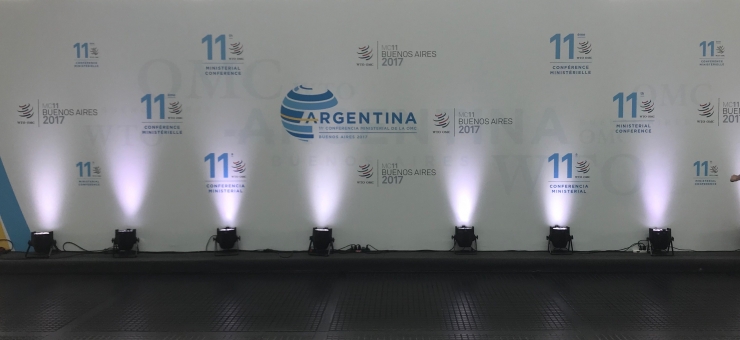UNI reflects on WTO meeting: The Big Data Putsch has failed

WTO Ministerial Meeting in Buenos Aires ends with what some delegates called the worst result ever. Its time for the WTO to think again
The WTO finds itself firmly on the back foot after a traumatic week. It began with the scandalous blacklisting of civil society representatives and trade unions by the Argentinian government, and ended with the WTO Ministerial concluding with no Ministerial Declaration and a strong signal to the WTO to think again.
Whilst the Ministerial Conference albeit issued a “we continue our work programme” ecommerce statement, the attempts by strong WTO members, lead by the EU, Japan, the US and Canada, to move the signposts of the WTO by adding new e-commerce rules, have failed.
Ending in a lukewarm joint statement signed by only 42 countries plus the EU, these countries will continue to “initiate exploratory work together toward future WTO negotiations on trade-related aspects of electronic commerce.” They could hardly have chosen duller words.
UNI Global Union, together with our union and NGO colleagues, have played a key role in debunking the often ill-informed and unrealistic arguments made by these signatories. We have lobbied hard, engaged the press, handed out information and held actions to highlight how these proposed rules would not only deepen the digital divide across the world and harm SMEs and workers, but would ultimately be a benefit for Big Tech at the expense of all others.
UNI Global Union General Secretary Philip Jennings comments: “We want a WTO that has agreements that promote the common good, not just those of the Big Six. The world needs politicians who will take responsibility and find ways to empower the people - all people - across our planet. The proposed e-commerce rules would do just the opposite.
“It is shameful that some of the richest nations in the world expect the Global South to sign away such an important resource such as data. Let’s first tackle the challenge that over 50% of the world’s population do not have access to the internet. Then, and only then, should we start discussing how we can find models that lets all people benefit from the value of data.”
UNI Global Union will continue to defend workers’ interests in relation to these e-commerce discussions, which undoubtedly will continue to be pushed in as many places as possible. Philip Jennings will take the message that workers’ right have to be central to the digital revolution, to Davos next month.
Jennings concludes: “We have a task in front of us to continue to raise the public awareness towards these issues. In the end of the day, its your data and mine that they are discussing to let flow across the world and be bought, sold and used by whoever for whatever purpose. We must claim our privacy rights, our human rights and we must aim for inclusive digital policies. It is unacceptable that these governments haven’t learnt their lesson and will continue to discuss e-commerce issues behind closed doors”

